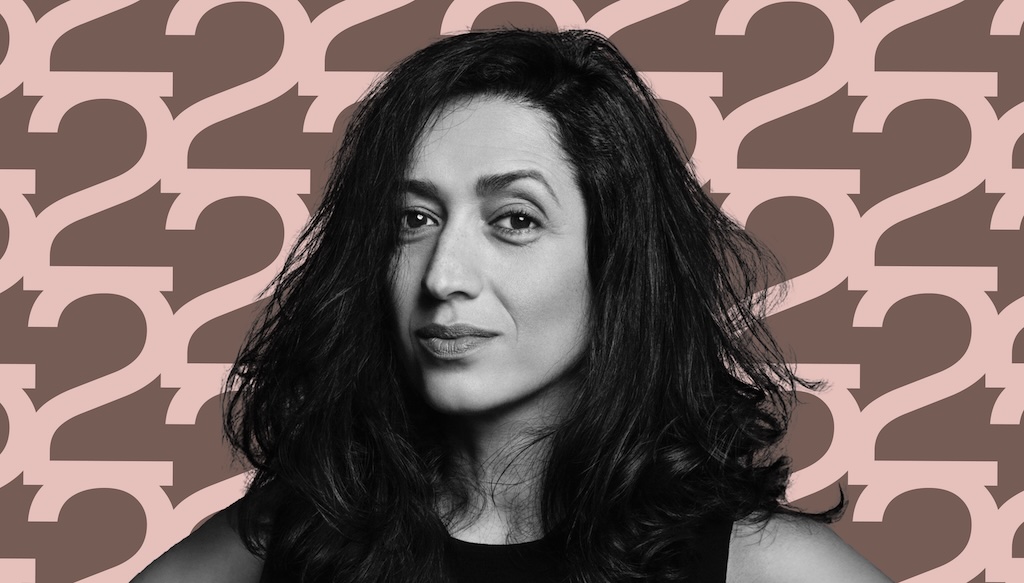Sharoz Makarechi of Substance and Plaid America Takes a Humanist Approach to Branding
Pushing for clean cannabis

Sharoz is the founder & CEO of Plaid America—the creative force behind the modern 12-pack which she brought to market in California under two brands, Substance and Skewville. Each box of minis brings together an artist, a cultivator and a non-profit working to propel racial equity.
Earlier, Sharoz was the CCO of Think Tank 3, a brand studio which she ran out of a storefront in NYC. Other posts include BBDO, DDB and TBWA/Chiat Day.
We spent two minutes with Sharoz to learn more about her background, her creative inspirations and recent work she’s admired.
Sharoz, tell us …
Where you grew up, and where you live now.
Iran. My mother and I landed in Greenbelt, Md., but I didn’t really grow up until I got to NYC where I spent most of my life. Living in L.A. now, Venice to be exact.
How you first got interested in cannabis.
Late junior year at the School of Visual Arts, my pal Adam (aka artist Ad Deville) knew it would help take some of the edge off—and it did. Professionally, when I set up my first creative business, Think Tank 3, we were tapped to get legalization on the ballot in Alaska during 2004. We did that part successfully but Measure 2 didn’t pass. Doing research for that project, I began to deeply question the government’s false “war on drugs.” The tagline was “Stop The Hypocrisy,” and we presented a spot where paramilitary-clad police enter a building, presumably to deactivate a bomb or find Bin Laden. They come face-to-face with a cannabis plant in an otherwise empty warehouse. It’s no threat at all, in fact ready to serve and heal. After that, I did a bit of advocacy work in support of NORML, and created pro-bono ads that ran in High Times. Usually I tell people I started on the medical side in 2013, creating the branding standards for applications starting with a win in Connecticut. But looking back, I can see Cannabis has been part of my world view and connected to my interest in racial equity much longer than that.
One of your favorite projects you’ve ever worked on.
I wrote a campaign for Volvo that truly represents my approach to advertising—human-centric and timeless. It created an opportunity for people to tell a story about someone they want to see in a safe car. Many years later the line still resonates: “Who Would You Give a Volvo To?”
A recent project you’re proud of.
I designed a flag, the universal equity flag. It represents humanity, in totality, in harmony. It’s a symbol that visualizes an invisible truth: we are all one.
The biggest challenge cannabis marketers face today, and how to approach it.
Federal/State divide, consumer confusion about why some products can be ordered direct online and others only purchased in licensed dispensaries that are over-taxed and over-regulated. How to approach it is head on and often—we need de-scheduling of cannabis so independent brands can participate in DTC sales.
One thing about how the cannabis industry is evolving that you’re excited about.
I see more people talking about clean cannabis, pesticide free flower, ideally sun grown. There was a great article in the L.A. Times and WeedWeek that triggered more consciousness about the importance of knowing where your flower was grown, by whom and who tested it—something I’ve been advocating for since 2018.
Someone else’s work, in cannabis or beyond, that you admired lately.
Hiii Magazine is beautifully designed and mainstream in as edgy a way as possible. I’m also a fan of Honeysuckle and their approach to contributing to culture through film and photography.
A book, movie, TV show or podcast you recently found inspiring.
Book: Salman Rushdie’s Knife, a memoir of an attempted murder. And Sebastian Junger’s In My Time of Dying.
A visual artist or band/musician you admire.
Music: Thelonious Monk, Gustav Mahler and the Beastie Boys. Artisst: Chris Burden Ida Badal, Kara Walker, James Kerry Marshall, Agnes Martin. Actor: Ethan Hawke.
Your favorite fictional character.
Marcel the Shell with Shoes On, The Missing Piece by Shel Silverstei, and Tijuana Jackson, ex-convict turned motivational speaker, the brainchild of actor/director, Romany Malco. Also Wonder Woman.
Someone worth following in social media.
Tijuana Jackson’s YouTube channel for sure. And my pal Daana Townsend on IG, a sociology teacher whose appreciation for James Baldwin mirrors and fuels my own.
Your main strength as a marketer/creative.
I have been a creative, a marketer and a client. Sometimes all three at once. I see the world in intersections, and I love solving communication puzzles.
Your biggest weakness.
I’m a humanist. Zero interest in zero-sum thinking,
One thing that always makes you happy.
Seeing older people in love, holding hands, out and about, laughing like they mean it. It gives me hope.
One thing that always makes you sad.
How Islamic Fundamentalists turned Iran into the Islamic Republic, a gender apartheid that’s been repressing, torturing and killing its own people for 46+ years, In 2022 there was a window to help people on the ground topple the regime, the first revolution led by women— the international community pretended not to hear our screams—screams that might have prevented 10/7 and the destructive wrath of multiple intersecting wars.
What you’d be doing if you weren’t in the cannabis industry.
Flying helicopters in conflict zones, and if I could get over my shyness, performing my one-woman-show.
2 Minutes With is our regular interview series where we chat with creatives about their backgrounds, creative inspirations, work they admire and more. For more about 2 Minutes With, or to be considered for the series, please get in touch.



 Events
Events